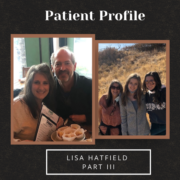HCP Strategies for Navigating the Pre-trial Eligibility and Informed Consent Process
HCP Strategies for Navigating the Pre-trial Eligibility and Informed Consent Process from Patient Empowerment Network on Vimeo.
How can myeloma patient communication about clinical trials be improved? Clinical trial nursing director RuthAnn Gordon from Memorial Sloan Kettering Cancer Center discusses clinical trial eligibility determinations and the consent process for patients.
Download Resource Guide|Descargar guía de recursos
Related Resources:

|

|

|
Transcript:
Dr. Nicole Rochester:
Ms. Gordon, you’ve been doing this for a long time. In your experience, what are tried and true strategies that healthcare providers can implement to effectively communicate with their patients about clinical trials when speaking to pretrial eligibility determination and the consent process specifically?
RuthAnn Gordon:
Yeah. Thanks for the question. I think that an important thing whenever we’re talking to our patients is to really understand where they are with understanding and how they learn. So it’s important for us to know what their health literacy is so that we’re making sure that we’re talking in a language that they can understand and using words that are appropriate. And so that’s key. Clinical trials have a lot of comprehensive and complex assessments that are needed for pretrial eligibility, right?
So I think it’s really important to make sure that we are being transparent as to what they can expect. We don’t want them to have surprises later on and then not feel like they want to continue with that process. So I do recommend to my providers and my research nurses, sometimes get out the hard stuff up front. Know if they’re going to be there for 12-hour PKs. Let them know. It shouldn’t be a surprise. And I think that that really helps patients. First, they get involved in the process, they know what to expect, and you can really have more confidence in their adherence.
The other thing is to allow time for the conversations, right? We need to allow time for our patients to ask questions. And the consent process can be lengthy. There’s a lot on the document. Sometimes it’s quite long. So you want to make sure that they’re in a state of mind to have the conversation, that you allow time for questions, and that you make it an exchange between the two of you. It’s a dialogue. It should be.
And you should come with understanding where they’re at; understanding a little bit about what’s going on behind the scenes, right?What’s happening at home is important as you’re talking about pretrial eligibility, as you’re talking about what they can expect on trial, just to get a full picture of them. So I think that those to me are very helpful. Providing take-home information to the patient so they have something to reflect on later is also really important, because they’re not going to grasp everything in that one session. And consenting is like an ongoing process, right? You have one conversation, you probably have 10 more.
Dr. Nicole Rochester:
That is wonderful. Thank you so much for sharing that. And I really appreciate that both of you have highlighted the importance of health literacy, and meeting our patients and families where they are and making sure that they understand, and this idea that it’s a continuum: That there may be multiple conversations that will be necessary.










